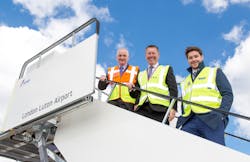Anyone who has ever been caught in rush-hour traffic, can appreciate the frustration and challenges that come with congestion. At London Luton Airport (LLA), congestion on the ramp was causing similar issues.
An abundance of ground support equipment (GSE) was crowding stands and making the turnaround process for ground handlers difficult. As a result, a number of parties came together to find an answer to the problem.
A GSE pooling program was instigated by Luton’s head of airside, Liam Bolger. Airport officials say airside congestion was no secret, and ramp agents were in need of a solution. So LLA met with the two ground handling firms operating at LLA, Swissport and Menzies, to discuss the pooling idea further.
“They along with the airport authority and TCR set up a trial before the airport conducted a formal tender process for the provision and management of shared GSE,” explains Bolger.
“Everyone saw the sense in reducing the amount of GSE, but no one really knew how it would work,” he admits. “All-in-all, everyone was more enthusiastic than skeptical, otherwise, we would never have achieved as much as we did in such a short period of time.”
From May 2015 to August of that year, LLA ran a trial of the program on five of the busiest aircraft stands using older equipment.
“After summer was over, we regrouped and started putting together the tender document, which was submitted late December 2015,” Bolger says. “The contract was awarded to TCR and we initially had an implementation date of April 2016.”
However, he explains parties involved underestimated the amount of legal work on the contractual side, so they didn’t achieve sign-off until December 2016.
“The first of the equipment was rolled out late January 2017,” Bolger continues. “The rollout isn’t complete – all the equipment is new, so we have been held back with manufacturing slot availability.”
Under the terms of the license, Swissport and Menzies – as well any future ground handlers – are obligated to use the pooled equipment at Luton. However, there are some costs associated with the program, according to officials at Swissport.
“We understand the merits of the solution from an operational perspective in an airport with infrastructure limitations,” company officials say. “However, the complexity and cost of GSE pooling at Luton, which only covers certain equipment, is a more expensive solution, which is ultimately paid for by the carriers and the traveling public.”
Phase 1 of pooling covers aircraft steps, GPUs, baggage belts and ancillaries such as Passenger Integrated Guidance Systems (PIGS), chocks, cones, telematics, insurance covering the first £500 of damage per event and fuel, which is recalculated at agreed intervals, as well as GSE maintenance.
Costs associated with GSE, such as fuel and maintenance are figured on a price per turn. Bolger says everyone pays the same, creating “a level playing field.”
“Phase 2 is to look at the feasibility of sharing pushback tugs, tow-bars, EBTs and baggage dollies,” Bolger adds.
As a result of the program, the 600 assets on the ramp have been greatly reduced, with Bolger noting the intention is to bring that number to less than 300.
These assets are tracked with telematics to ensure the equipment remains within its designated stand or zone. The telematics platform also records the last user in the event of damage, poor parking, etc. What’s more, the technology can highlight unserviceable equipment and report on fuel levels.
Bolger explains, the telematics solution can restrict access to only those staff trained to use the equipment itself, which is achieved via an employee’s airport ID card.
“It is also intended to use telematics to track and analyze data on the turnaround itself for the purpose of understanding and improving the process,” Bolger says.
According to Bolger, all parties involved have realized various benefits since the pooling program was implemented.
The biggest benefit is significantly less congestion on the ramp, which in turn has improved safety while modern, more efficient equipment has provided environmental benefits.
“The airlines benefit from improved safety on the stand, and the fact they don’t have to wait for equipment to be towed from other areas around the airfield,” Bolger says. “The passenger also benefits through the improved efficiency of the turnaround and not having to negotiate other equipment at the head of stand when boarding/disembarking.”
For ground handlers at LLA, Bolger says agents have previously invested a lot of time and resources into managing GSE – time and resources that can now be better invested in delivering their product.
“Having equipment available on stand eliminates the need to move assets between stations for summer uplift and winter down turn, etc., and reduces damage to the equipment itself as it is not being towed around the airfield,” Bolger says, noting 95 percent less damage on pooled stands.
“Other benefits are the reduction in assets used to tow equipment,” he adds. “But the most significant benefit is the mitigation of risk when tendering the airline contracts, and most particularly, when a contract is lost, the handler is not left with the cost of having to procure more equipment to meet new contracts or the losses incurred in having assets depreciating if a contract is loss.”
Bolger says he has not seen any particular drawbacks with the pooling program. He notes there have been concerns that access to the ground handling market will be less restrictive because of pooling.
“However, despite its image, ground handling requires a good degree of knowledge, skill and professionalism. Therefore, ease of accessibility, I believe, is grossly overestimated,” he explains.
After implementing the pooling program, Bolger says other airports and airlines across the globe have shown an interest in the concept. Indications are that London Gatwick could be the next location to mandate pooling with a number of other airports in the United Kingdom preparing to follow suit as well.
While the program has had a promising beginning, Bolger says there are still opportunities to evolve and improve the pooling system.
“The guiding principle of pooling is to create greater efficiencies,” he says. “There are significant opportunities to improve the process, employing the latest developments in GSE technology and in extending the principle beyond GSE and into certain defined processes.”
About the Author
Josh Smith
Editor
Josh Smith served as editor of Ground Support Worldwide as editor from 2016 through 2024. He oversaw production of the print magazine, created GSW's newsletters on a daily basis, and updated the latest news on AviationPros.com.

